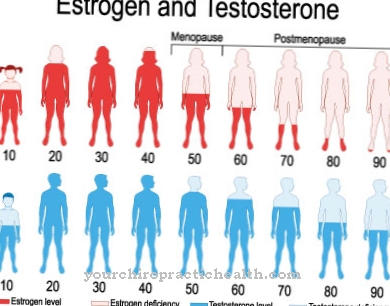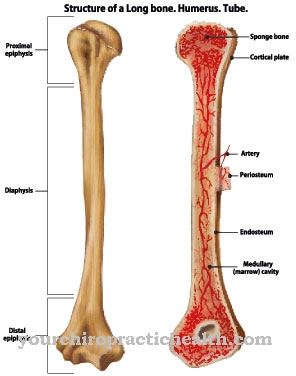Klinefelter Syndrome is the name for a maldistribution of the sex chromosomes. It only affects men and is characterized by an extra X chromosome. The severity of the symptoms is very variable. Treatment is therefore not necessary in all cases when Klinefelter syndrome occurs.
What is Klinefelter Syndrome?

© Alila Medical Media– stock.adobe.com
The Klinefelter Syndrome is a hereditary constitution based on a chromosomal maldistribution, whereby the patients are exclusively men. The cell nuclei of those affected have a superfluous X chromosome, i.e. they have 2 instead of just a single X chromosome. The literature also describes cases with 3 or 4 X chromosomes with an unknown cause.
The X chromosome is the female element in sex determination. The Klinefelter syndrome belongs to the phenomenon of chromosome aberration or aneuploidy, as deviations from the average constellation are also called.
The concept of this genetic variation, sometimes also referred to as hereditary disease, goes back to the American doctor Harry Fitch Klinefelter (1912-1990), who was an associate professor of medicine in Baltimore. In 1942 he was the first to describe the Klinefelter syndrome, which was subsequently named after him.
causes
The Klinefelter Syndrome arises causally during the development of the germ cells. The point in time at which the error occurs is the meiosis, during which the double set of chromosomes is halved.
It can happen that an X chromosome does not get into its target cell in a physiogenetically "correct" way, but remains. The result is a germ cell with an excess X chromosome. Both the egg cells and the sperm, which contribute to the determination of the sex of the man on the Y chromosome, can be affected.
Normogenetic egg cells have 1 X chromosome, normogenetic sperm either 1 X or 1 Y chromosome. The "Klinefelter egg cells" have the constellation XX, rarely XXX or XXXX. The "Klinefelter sperm" have the following set of sex chromosomes: XY, XXY or XXXY. After the egg cell and sperm have merged, the result is the composition XXY (rarely also XXXY or XXXXY) and lead to Klinefelter's syndrome.
Symptoms, ailments & signs
The symptoms of Klinefelter syndrome can often only be noticed from puberty. Before that, they are usually only very weak. The main symptoms of the disease are underdeveloped testicles and a noticeably low level of testosterone. The sex hormone testosterone triggers puberty in healthy boys and ensures that the secondary sexual characteristics develop.
If there is a deficiency, these developments do not occur or take place much more slowly than in young people of the same age. Another striking symptom is the inability to conceive. Depending on the severity, the onset of puberty can be greatly delayed. Those affected usually have only sparse or no male body hair. The beard does not grow.
The voices of adolescents with Klinefelter syndrome are high and hardly change. Excessive breast development can occur in late puberty. The penis is noticeably small. Sometimes there is an undescended testicle. In general, people tend to have a low libido. Symptoms such as tall stature, osteoporosis, reduced bone density, scoliosis, low muscle tone, exhaustion, tiredness or anemia (anemia) often occur.
In childhood, some sufferers have cognitive impairments, delayed speech development, or motor disorders. This can lead to learning difficulties later. In addition, those affected often experience dental problems such as misalignments or caries.
Diagnosis & course
At the Klinefelter Syndrome the testicles do not develop to the usual extent. This, so-called "hypogonadism", also results in an inadequate release of the hormones that determine masculinity.
This tends to result in the development of secondary sexual characteristics that are usually attributed to women. An increased growth of the breasts as well as a wider pelvis and little body hair are characteristics of the affected men. Most of the time they are also incapable of procreation, although there are no disturbances in their sex life. The symptoms are sometimes more, sometimes less pronounced, sometimes so discreet that diagnosis or treatment is never necessary.
If Klinefelter's syndrome is suspected during adolescence, the doctor will order a chromosome count using a light microscope. It will also reveal whether there is one of the rare "mosaic cases", the causes of which are unknown. These variants are called “mosaic types” because only parts of the body are affected by the chromosomal abnormality. The result is an incompletely pronounced Klinefelter syndrome.
Complications
Klinefelter syndrome can lead to various complaints and complications for the patient. In most cases, however, there is a strong tall stature, which mainly affects the legs and arms. The muscles of the person affected are also weakened, so that the patient's resilience is less. This can also negatively affect the child's development.
Motor development is also delayed, so that the person concerned may have to rely on the help of other people in everyday life. It is not uncommon for patients to be irritable and suffer from severe mood swings. These can have a negative impact on the social environment and lead to severe complaints. Infertility also occurs and the man is unable to procreate.
The men also suffer from a very slight beard growth, which can lead to inferiority complexes or a reduced self-esteem. Klinefelter syndrome is often associated with psychological complaints. The treatment of Klinefelter's syndrome takes place with the help of various therapies, although not all symptoms can be limited. In most cases, it cannot be predicted whether there will be a reduction in life expectancy.
When should you go to the doctor?
If the child is suspected of having Klinefelter syndrome, a doctor should be consulted. Symptoms such as tall stature, muscle weakness, and small testicles indicate a serious condition that needs to be diagnosed. The doctor can determine whether the symptoms are due to Klinefelter syndrome and, if necessary, initiate treatment immediately. Early therapy is essential to avoid a severe course with permanent damage.
For this reason, all abnormalities should be clarified quickly, especially visible malformations or behavioral abnormalities. Children who withdraw from social life or who are unusually irritable require medical and therapeutic treatment. The individual symptoms can usually be treated well, provided they are recognized and treated at an early stage. If psychological complaints have already set in, treatment by a psychologist is indicated. Therapeutic support is also useful for the parents, as the disease can be an enormous burden in the long term. The right contact person is your family doctor or a specialist clinic for genetic diseases.
Treatment & Therapy
From Klinefelter Syndrome Affected men usually suffer most from the consequences of testosterone deficiency. The “male” hormone is therefore topped up with medication in some patients. The doctor must also take into account that Klinefelter syndrome also leads to diabetes mellitus.
If necessary, he will arrange an appropriate diet or proceed with medication. Osteoporosis is another complication of Klinefelter syndrome. The orthopedic surgeon has to deal with the consequences of the “softening of the bones”. The delayed language development that is diagnosed in some of those affected can be compensated for by early remedial classes.
Psychological issues are also relevant with regard to Klinefelter syndrome. Because some affected suffer from a disturbed sense of identity with regard to their gender role. A psychotherapist offers suitable help here.
Social discrimination is expressed, for example, in some representations even in specialist literature. There, the Klinefelter syndrome is still attributed an intellectual disability, which is not the case according to recent studies. Educational work is required here to reduce prejudice with regard to Klinefelter syndrome.
Outlook & forecast
Klinefelter syndrome only occurs in people of the male sex. Since it is a chromosome disorder, the disease cannot be cured. The patients see each other
Long-term therapy exposed to alleviate the symptoms. A deficiency of the hormone testosterone is found in the person concerned. This must be balanced over the entire life span so that symptoms can be relieved. As soon as the hormone therapy used is independently discontinued, a relapse of the symptoms can be expected. If the administration of the hormone can be successfully implemented over the long term, the patients often report that they are free of symptoms.
A secondary disease is usually diagnosed on the basis of the syndrome. This usually has a chronic form. The subsequent disturbances must be taken into account when making a prognosis. They worsen the overall condition and lead to increased stress for the person concerned. In addition to the physical impairments, emotional and mental tension is to be expected. This can have a negative impact on the general well-being and thereby further deteriorate the patient's health.
In severe cases, mental disorders develop due to Klinefelter's syndrome. If therapy is used, quality of life is improved in most cases. Nevertheless, many patients refuse to seek psychotherapy.
prevention
The Klinefelter Syndrome cannot be effectively prevented due to its genetic causality. At best, couples who want to have children should keep an eye on the fact that aneuploidies increase with the age of the mother. This can also be seen in Klinefelter syndrome.
Aftercare
As a rule, the patient with Klinefelter syndrome does not have any special or direct options for follow-up care, so that an early diagnosis and subsequent treatment should primarily take place in this disease. Self-healing cannot occur, and complete healing is usually not possible either.
If you want to have children, a genetic examination and consultation should always be carried out first in order to prevent the syndrome from occurring again. The symptoms themselves are usually alleviated with the help of medication. It is important to ensure the correct dosage and regular intake. In children, parents should check that the drugs are being taken correctly.
A doctor can also set up a nutrition plan to counteract the symptoms of Klinefelter syndrome. This plan should be adhered to, whereby a healthy lifestyle with a balanced diet has a positive effect on the further course of the disease.
Most of those affected also need psychological support. Loving and intensive discussions with parents and relatives also have a positive effect on the psychological state of the person concerned. Usually, Klinefelter syndrome does not reduce the life expectancy of those affected.
You can do that yourself
With Klinefelter syndrome, the possibilities of self-healing are severely limited. For this reason, those affected are primarily dependent on medical treatment in order to avoid further complications and complaints.
Since the disease significantly increases the risk of diabetes in many cases, a healthy lifestyle with a healthy diet and plenty of exercise should be observed. The respective diet can be specified by a doctor or a nutritionist. When osteoporosis occurs, exercise should be exercised in moderation and with caution. Slowed language development can also be alleviated through various training courses. The parents in particular have to show initiative and can encourage this development with various exercises at home.
The psychological complaints of Klinefelter syndrome do not always have to be treated immediately by a psychologist.Conversations with other people affected or with closest friends or family often help. Inferiority complexes can also be alleviated. Because of the intellectual disability, those affected are dependent on intensive and loving care. In particular, caring for loved ones has a very positive effect on the course of the disease.





.jpg)







.jpg)

.jpg)
.jpg)











.jpg)